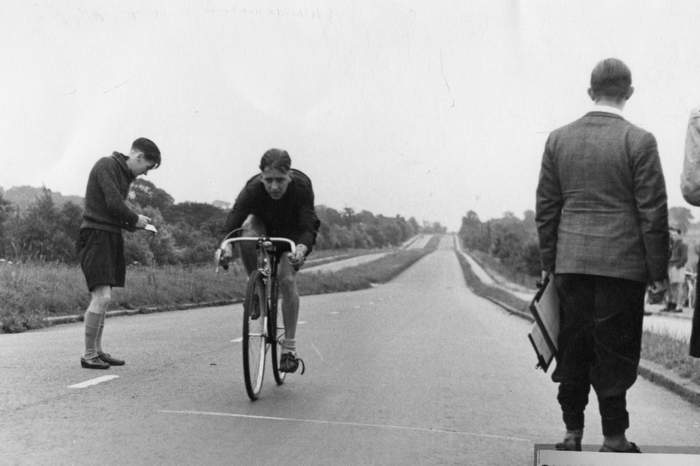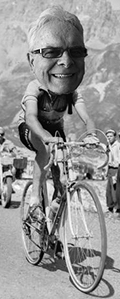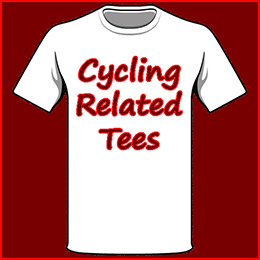Once upon a time, Britain had a bike culture
 Thu, July 29, 2010
Thu, July 29, 2010 When I left school in the early 1950s my first job was apprentice machine tool engineer with a large bearing manufacturer in Luton, England.
I rode my bike to work each day; a distance of five miles. My father did the same; a bicycle was his only form of transport. He never in his lifetime owned a car or even learned to drive one.
We could have caught a bus to work, but did so only in the extremes of winter when the roads were frozen over with ice and snow. Otherwise we rode our bikes in all weathers. So too did most of the other workers at the factory.
When the factory was built many years before, there was no provision made on the premises to park cars, with the exception of a few spaces for the top executives. Workers arriving by car had to park on the surrounding streets.
The majority of the workers arrived by public transport, bike, or on foot. Just inside the factory gates were hundreds of bike racks that held the bikes standing up at an angle, resting on the back wheel. There was a corrugated metal roof over the racks, to protect the bikes from the elements.
No one locked their bikes; we just parked them and walked to our workplace. I wore my regular work clothes, with a water-proof cape if it rained. The only other special cycling equipment was my cycling shoes and trouser clips. I kept my work boots at my work place.
I only did this because my bike had toe-clips and straps, and the shoes had metal cleats nailed to the leather sole. Most workers arrived wearing their work books, on more utilitarian bikes with plain rubber pedals.
This was the norm for most of the working class in the UK throughout the 1950s. Cycle racing, and in particular time-trialing was very much a working class sport. Many riders had only one bike that they raced on, trained on, and was their transport to and from work.
I was in my early thirties before I got my first driver’s license and owned my first vehicle. It was a van that I used to transport my bike to races. It allowed me ride in events further afield.
In 1969 I moved to Worcester in the West Midlands area of England. I was married by now with two small children. My in-laws, the children’s grand-parents lived near Mansfield, Nottingham, about 100 miles away.
To visit them was at least a six hour drive, using a network of various roads that ranged from main trunk roads to tiny country lanes.
We must have passed through dozens of little towns and villages on the way, each with narrow streets that slowed the journey. A trip to grandma’s was a chore with two small children who were asking “Are we there yet?” within ten miles of setting out.
Then throughout the 1970s, Britain embarked on building a nationwide network of trunk roads and motorways linking all the major cities together. The trip to grandma’s now only took two hours.
All this coincided with the discovery of oil in the North Sea off Scotland. I’m not sure if this had anything to do with it, but looking back it was a period when Britain became committed to the automobile, just like the US.
People started buying up cheap housing out in the rural areas, and the newly built network of roads meant they could commute long distances to work in the city in a relatively short time.
All very nice, but now with thousands converging into the large cities each day, how do you accommodate all these cars on narrow city streets designed and built before the 1800s when people drove horses and carts? Where to park them all becomes a huge problem.
Going back to the 1950s there were less people, and on top of that a typical family like mine, consisted of my mother and father, and my sister and me. No one owned a car; my father and I rode a bicycle, and my mother and sister used public transport.
Forward to today and that same typical family will own as many as three or four cars. Great Britain in the mean time did not get any bigger; it is still about the size of California.

The picture above shows a 1950s time-trial held on the main trunk road heading east from London to Southend. Agreed that it would have been early in the morning, but on this dual-carrageway, (Divided Highway in the US.) there is not a car in sight. It is not without reason the 1950s is referred to as “The Golden Age of Cycling.”
Countries like Denmark and Holland did not begin to develop a bicycle culture in the 1970s, they took steps to expand on what they already had. Those two countries are a fraction of the size of the UK; about the size of Wales.
They had the foresight to see they could not afford the luxury of allowing every man, woman and child to own an automobile. Britain could have done the same, had the politicians foreseen where they were headed.
You don’t just need a supply of oil to support a car culture; you need a lot of space. America has so much space it wastes it, and even so still has problems with congestion in all major cities.
Britain has to do something or it will become a huge parking lot with no one going anywhere. They need an efficient public transport system into all major cities, and penalize cars driving in as they are doing in London.
And people need to ride bikes again; I did it and so too did my father, all his life. Back in the days when we had a bike culture






















Reader Comments (24)
Nice article Dave. Couldn't agree more. At some point the oil will run out and everyone will be back on the bike...
Nice post and cool picture of that empty highway. As the population and traffic increases, you almost forget how less crowded metro areas used to be.
We have "miles" to go on getting more people to ride bikes, though there are pockets of bike culture in various cities in the U.S. Culture as in bikes for transportation. Here in Seattle, it does exist and I've seen it grow over the years - great to see.
I bike commute about 90% of the time (sometimes more) and it makes so much sense, it's almost loopy. What amazes me are the recreational cyclists that don't commute. Incredible, since they're already cyclists.
In any case, even though the trend is growing, I don't see it pushing car use out anytime soon. Still, we'll take what we can.
Speaking of a place being a "huge parking lot with no one going anywhere," the current (August 2nd) issue of the New Yorker has an in-depth article on the crippling traffic jams in Moscow. (Sorry, readable online only if you subscribe.) Year-round bicycling is obviously more difficult there than in the UK, or most places in the US, but it's an interesting picture into how bad the situation can get.
I doubt if you could find a city in Britain that does not have a local cycling scene going.
London, Edinburgh, Bristol, York, Cardiff etc. etc; they've all got their own thing going. There are all kinds of get-togethers, schemes and courses for those new to cycling as well as those who are returning to the pleasures of riding a bike.
You've got Bike Week, with hundreds of events attracting thousands upon thousands of participants to all sorts of cycling events and gatherings - without a single ''ride-on-your-own-up-and-down-a-deserted-lane-in-the-middle-of-nowhere-at-6am'' type event to be seen anywhere on the programme.
Then you've got the Greater London Authority picking up 28 million quid from a bank who's happy to pay for the privilege of being associated with London's bike hire scheme.
Meanwhile, bike shops up and down Britain are buzzing thanks to the 'Cycle to Work' tax break incentives on offer to commuters.
British Cycling and the CTC are reporting record levels of membership and British racing cyclists are no longer considered a joke by their Continental counterparts. Bike races are no longer clandestine affairs held on secret courses where audience participation is actively discouraged.
Britain has a British Pro Tour team competing at the highest level and containing some of the hottest prospects in the peloton. It has a budget, equipment and management structure that's the envy of the cycle racing world. Then there's the 10 (Ten) GB Olympic champions, who between them, picked up 13 Olympic gold medals at Beijing.
Which, when you look at it, is all a bit shit really.
So yeah, let's all get back to the days when Britain had a bike culture....let's all get back to that good old 'cloth cap' image.
Monty,
Do I detect a little hostility in your comment? I thought I was on your side.
I agree that British cyclists are doing great, but I have also read stories were these Olympic cyclists get honked at, shouted at, cut off, and their lives put in danger while out training; just like any other cyclist.
When all cyclists are revered and respected in the UK as they are in certain parts of the continent of Europe, then you have a cycling culture. This is what I am talking about; did you even read the piece or just the title and then form an opinion?
Also you might read a little bit about the history of cycle racing in Britain, about people like Percy Stallard, and had it not been for people like him in the past, Britain would not be enjoying this cycling success at a world class level, but would be instead stuck in a mold of time-trialing in secret, in the wee hours of a Sunday morning.
Dave
Bicycle as 'poor mans' transport' is part of the reason for the decline. The masses don't want to be associated with (perceived) pauper mode of travel.
The resurgence in cycling of late is, in large part, a middle class resurgence: with those who could afford big cars, choosing, instead, to cycle.
The latest cycling figures from the National Travel Survey back this up. It's not a bad thing. The keen and the concerned are leading the way, especially in large urban centres such as London. The mainstream acceptance of cycling as a normal way of getting about will surely follow. Gridlock and fossil fuel depletion will see to that.
I was born in the '70s, and I can remember us not running a car regularly until the early/mid '80s, it was just too expensive. We'd generally hire or borrow one for family holidays, otherwise we went to places by walking or public transport.
(My mother cycled, but we tended not to, I think even then there was unease about the increasing amount of motor traffic and riding in it).
If we've lost anything, it's a sense of what's appropriate for each type of journey; under two miles, it's generally easier to walk, between that and ten to bike, over that to take the car or some form of public transport. Yet I see people who aren't physically infirm, or having any need to carry heavy gear or luggage doing 2-3 mile journeys in a car, and then complaining about traffic on the way, and parking at the other end.
Carlton, certainly congestion isn't going to get better (given the number of 2+ car households) - I'm wary of the green/fuel price "lever" though, because a technological solution could render all that moot.
The best argument for taming the car is its effect on our health, and our communities (the way fast roads separate neighbourhoods, and rob us of the sort of community life you see in European cities, not to mention their toll on the vulnerable).
And wrt Monty's comment, it's probably better here than it has been in a while, but I'd suggest riding a dual carriageway in, say, Northern France, and one here for a graphic illustration of the differences between the two cultures with regard to cyclists (and to be fair, any non-motor traffic).
The impatience and lack of consideration here starts pretty much as soon as you're off the ferry at Dover, ime.
I see where Monty was coming from; I've seen a two or threefold increase in cyclists along my route to work in the last 2 or 3 years which is along a Sustrans cycle path that's totally away from traffic and quite scenic. The National Cycle Network still continues to amaze me; I've always felt like a second class citizen in the 25 years I've been cycling regularly but the amount of money and effort that's gone in to establishing the network is impressive especially as it's for us plebeian cyclists.
Sure, I get abuse on the roads almost daily and it's a constant source of confusion to me why these people are so aggressive for often no good reason but it's not restricted to the UK. There's a video I saw recently of a pro team training in Holland (I think) where a motorist intentionally throws a bottle and hits one of the team, I've had abuse from drivers in France, Holland and Germany. Having just got back from the Outer Hebrides I'd say they're the most considerate drivers I've experienced.
Anyway, in fairness to Monty the piece came across, to me, as saying cycling in the UK is terrible but things are changing for the better and with fuel being £1.20 per litre (almost £5.50 per gallon), better cycle routes and provisions, tax free bike schemes, ride to work incentive schemes, etc. I'm sure more and more people will be getting on their bikes which can only lead to more empathy and hopefully even more respect. I'm not sure when you last cycled over here Dave but you should give it a go again, it's not as bad as you might imagine.
Bod,
I think Monty simply misread my piece as a putdown of Britain, and I would never do that. I was mostly just reminiscing on how wonderful it once was, riding a bike in the UK before all this congestion and craziness.
Also it was a comment on how "Improving" roads actually creates a problem. I see it all the time here in the US. By illiminating a bottleneck you just create another bottleneck further down the road.
The 1950s and 1960s were great and even the 1970s. If I was back in the UK now? For sure I would be out riding my bike, it can’t be any worse than riding in the US. And even here, I deal with it; I stay alert, and try to ignore any rudeness,
Dave
Many people think Dutch cycling rates are high just because 'it's in our blood'. This desperately needs some historical perspective :).
Just like in most countries, pre-World War II cycling in NL was popular and remained so a few years after (for economic reasons), for instance, with bike mode share rates in Amsterdam hovering around 55% of all trips, nationally at 40%. That quickly changed from the late 50's as cars became more dominant, so did policies that equated prosperity with car ownership > free reign. People on bikes in NL became more and more marginalized, rates dropped to a little over 20% in Amsterdam.
Shortly after the 1973 Oil Crisis and a string of deadly bike accidents in the late 60's/early 70's a group of people organized themselves and formed 'Eerste Enige Echte Nederlandse Wielrijdersbond (ENWB) - 'The First And One And Only Dutch Riders Union' in 1975, as a protest/movement against the 'General Dutch Riders/Drivers Union' ANWB which function was to represent cyclists and drivers equally, but didn't.
The ENWB was forced to change its name to Fietsersbond / Cyclists Union, but aside from that, it quickly became a force to reckon with, as it advocated successfully for better infrastructure, legislation and other bicycle provisions. They worked together with national, regional and local governments to establish integral bicycle transport policies that would make cycling safer/convenient again. For ALL people, young and old, aka 'the lowest common denominator'.
Their work raised public awareness of the need for bicycle infrastructure and a generally safer urban environment.
From the 80's on, old infrastructure was updated/improved, new infrastructure was developed and implemented, and institutionalized by the national government (ps, any political party that would now campaign against bicycle policies would kill it's electorate prospects :)).
Read the Fietsberaad (Center of Expertise on Bicycle Policies) 'Cycling In The Netherlands - 2009' document (pdf) for reference, particularly section 2.1 'Dutch bicycle us in a European perspective'.
These comprehensive policies led to the 1990 National Bicycle Plan, that standardized and mandated high quality infrastructure. (For instance, no new housing (or even industrial park) development is allowed to be executed without the integration of bicycle infrastructure, and each housing design needs to provide for a minimum amount of space for secure, indoor bike parking.)
The results are evident. Dutch bicycle policies have been successful (nearing 30% of all trips nationally, since 2007 Amsterdam boasts more bike trips than car trips (55% inner-city, 37% great-Amsterdam) and trips to train stations have been rising by over 10% annually, Groningen's city restructuring of 30+ years have led to 60% mode share, and the average city bike rate in NL is 30%, nationally it's nearing 30%) because they embraced all primary and secondary aspects of what makes cycling safe and convenient, and identified 'the bull in the China shop': the car driver. It's about protecting people on bikes, not putting the burden of safety on them. This is widely accepted, mainly because all people ride bikes, including car drivers. There's no 'bike vs car', there's 'I take the car or I take the bike, dependent on convenience'. And since many cities have put in place traffic-calming measures, restricted car-use by high parking fees and/or have made their (routes to) city centers pedestrian/bicycle-friendly, many will choose the latter.
Investment in bicycle infrastructure and related policies/promotion is never-ending, the average spend per capita (16.7 million people) per year is about 22 euros. It's a no-brainer because it makes cities more livable, it's better for local businesses (proven over and over again) and it provides health benefits that are priceless. Actually, a recent calculation reveiled that every euro spent on bicycle provisions returns two euros of savings in healthcare.
The Dutch Model (if you will) is a big mixed bag of measures, they are all aimed at convenience, legislation that draws clear lines re: liability (in collisions with people on bikes car drivers are always at fault, no matter what, unless proven otherwise in court), and integral urban design. Layered with carrot-and-stick policies, it continues to grow. The Dutch also know that even here there's always need for improvements (as it's not like car ownership has gone down), so investment is a given and has become a-political.
Now that the rest of the world (US, UK, AUS, parts of Europe) are working hard to get back on track, you'll hear often that this Dutch model is almost impossible to mirror, often laced with the obvious urban myths and excuses. Nothing is farther from the truth, people just need to realize that it's all still man-made, it also had to deal with car-centric mindset and it took time, a long time. Aspiring to increase cycling in a meaningful way is to study, adapt and profit from what's already been done. A matter of sticking with facts and showing people deliverables. Taking best practices could also safe a lot of time.
PS: the 'flat-argument' re: NL; it's NOT the main reason why cycling is convenient. Were it not for the above described policies/provisions/infrastructure, not even 'born-on-the-bike' Dutch people would find it pleasurable or deem it safe to cycle from A to B on a regular basis.
Cheers,
Marc
I cycled everywhere as a teenager, and had just bought myself my first lightweight bike when my contemporaries were learning to drive. I saw how they quickly stopped cycling after passing their test, and because I really enjoyed cycling, I decided not to bother. Somehow, I never did. I'm lucky in that I don't need to drive for work. I still commute by bike, and recently took up time trials again at the age of 50. I agree that there is far more traffic these days (and drivers are more impatient, and rude to non-drivers, than they used to be), but there are still lots of very lightly-used lanes you can ride, at least here in the NW of England.
Great article dave. I really enjoy your historical articles. I'm only in my late 20s, and really enjoy hearing about these sorts of things :-)
I agree that there is far more traffic these days (and drivers are more impatient, and rude to non-drivers, than they used to be), but there are still lots of very lightly-used lanes you can ride, at least here in the NW of England.
First, forgive me for the long post but this is a theme I have contemplated before especially the more historic aspect of the topic. One wonders what it was like back decades ago, it sounds like it might have been really amiable to cyclists as you allude to.
Note these excerpts, the brand name mentioned is of no importance in talking about the 'big picture' and the social malaise of the times.
"The glory days of Claud Butler, as with many other lightweight marques, were the mid-to-late thirties and the immediate post-war period. This was a time when club cycling boomed in Britain and every town across the land had at least one active cycling club offering a full range of sporting, leisure and social activities. ...
....Great success continued through the late forties and into the early fifties, with Claud Butler celebrating his Jubilee ‘in the game' in 1953. By the mid-fifties the glory days were over, with club cycling beginning to lose favour as a popular activity across Britain. Several manufacturers' records show a sudden dip in production from the early fifties onwards. The phasing-out of war-time rationing, as well as increased affluence throughout the population, brought aspirations towards consumerism and motorized transport. This was at odds with the simple pleasures of club cycling. The ultimate distraction – television – also became more affordable at this time, with many thousands of households equipping themselves to watch the live broadcast of the Queen’s Coronation in 1953."
http://www.classiclightweights.co.uk/claudbutler.html
There are a great number of football/soccer books from the UK concerning the old days, I often wonder, someone should really write a full treatise on what the cycling scene was like back then.
I'm led to believe as a social outlet, going on weekend trips by bike, etc. that it was actually a big deal and real popular and of course, there were fewer cars. It sounds like it would have been truly great fun.
Lamentably, the last time I was back (2007) cars had driven bike culture into the ditch.
As I wrote in a story on my English boyhood, we were lucky to grow up in post-war Britain, when there were few cars on the road. My extended family on had a couple of cars and they were only used to "go to the seaside" or on some other adventure.
Everyone commuted to work on their bicycles.
Gr-r-r-r-eat article Dave.
Dave, I like your post.
As an ex-pat (since ~1998) living in Seattle, whenever I return to the UK I feel like there are more and more cars on the road. It's more of an anecdotal observation, but I definitely feel it. Combine that with the size of the roads (even Motorways are significantly smaller than Interstates in the US), the feeling of driving in UK is more and more cramped as time goes by.
This article reminded me of my uncle who was a top engineer but never bought a car. He simply biked his way to the office every single day which made his co-worker's eyebrows twitch.
Anyway, I too bike to work and sometimes I go paranoid over my bike even if i lock it up. I yearn for the time to come back when people just have to park their bikes unlocked and go ahead and work and find it intact.
Great article, Dave. By the way, the racks at SKF Bearings (Leagrave Road, right?) were there well into the '80s & early '90s. I know it's a long shot but did you ever run into a guy called Jeff Knowles? He was my Dad, & started at SKF as an apprentice toolmaker somewhere around '51 -'53. Rode a Bianchi.
Hello just been looking at your site. I was an apprentice at Napiers, Luton from 1951 to 57. I had 2 bikes made by Pop Hodge and his helpers - but had to file the "top quality" french cast lugs to a nice taper myself over 2 or 3 evenings. Pop also made me specify the tube lengths, crank height, angles, etc., etc. "if you are in engineering you should be able to do this" he said. There were two SKF employees helping him out in the evenings. My digs were only about 100 yards away so it was a pleasure to see work going on. He proudly showed me the seat tube transfer saying that his bike won the World Championship in about 1922. The surround of the transfer was taken from a Swan Vestas matchbox that was always near to hand to keep his pipe alight. There was a photo on the wall showing Pop on a penny-farthing in an early race
Somewhere I have the receipt for one of the frames signed off "yours in sport" Albert J Hodge. Wish I still had the bikes.
As has been mentioned here, Britain still has class distinctions.Central London should have almost no cars, but it has many, because there is so much money there. In August rich people from the Middle East ship their expensive cars by air to drive in London, because they can. This *really* bothers the British-born elite :-) These same people are astonished that a lowly person on a bicycle (a bicycle!) should expect them to suffer even a moment's inconvenience in order to make the cyclists' travel more convenient or safer. Very Upstairs/Downstairs. Still.
My perspective (FWIW) is as a Canadian (she's always been my Queen) who moved to the USA and then to the UK. So I have experienced all three. Canada and the USA have almost no public transport outside large cities. The population density is too small to support it. So even poor people drive. In fact, poor people drive more.
But in the UK, with a very dense population (more so than France or Germany) and with good public transport, well-off people still drive (or are driven) because it is seen as lower class to take public transport. Many job levels are "pegged" by the car they come with, and this is rigidly enforced (a subordinate would never, ever be allowed to drive a better car than the manager).
The UK has "age-identified" car "license plates" and used to issue new plates for cars once a year, but it became unworkable, because everyone waited until just after the new plate came out and then there was a land rush. Now it's every six months, but it's still a cycle. Why? Car models change at varying intervals. It's because you want the "newest" plate. Simply status.
Car is king in the US because there is no option. In the UK, it's because the middle class demands it. Just my observations/opinion.
I built and rode bicycles from first learning, till 18, when I enlisted in the Marines. I found it far faster, easier to get around in Chicago, than anyone in a car, due to congestion, this in the sixties and seventies, and continued to ride as a Marine for cross training purposes, and left it behind, when I retired, with multiple sclerosis.
I've worked hard, keeping in shape, it's the sole means of ameliorating the disease, and I've got back on bikes, found a Giant, Perigee I'd bought cheap, a dozen years ago, in a shed six months back, replaced tires and tubes cables and a chain, and am beginning to get some miles in, while building up the bike I never could afford, almost fifty years ago, on a Tange frame, weighing 3 pounds, five ounces as a 55cm, and finding the Campi components at bargain basement prices on ebay, and will shortly have a far better bike than ever before, for this broken down decrepit body I've worn down. I grin a lot, while wiping down the frame with scotchbrite, a friend going to shoot some primer, and while paint on it, shortly, and then I can assemble it, can't wait, like Christmas.
Few blogs I've ever crossed, so interesting, and full of memories of great pleasure. I truly enjoy the explanation of the work of building frames, and the changing techniques, never built a bike frame, but a few dozen motorcycle frames, with two in process.
Semper Fi,
John McClain
Vanceboro, NC